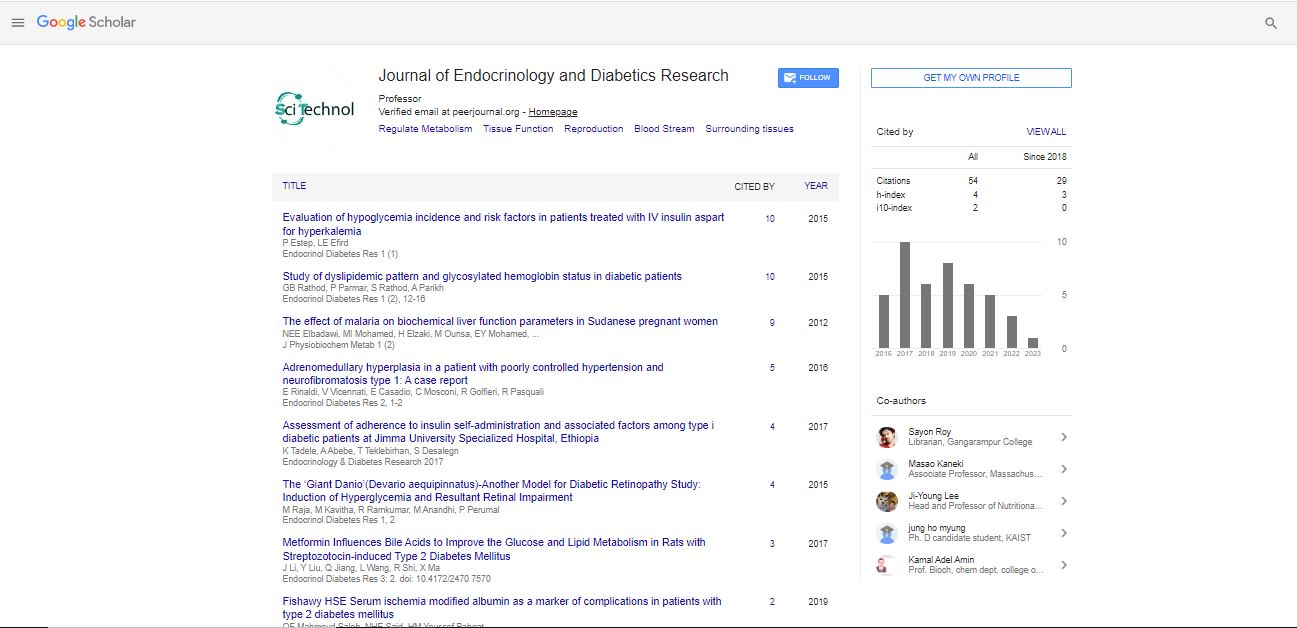Fibrosis delays wound healing in diabetes: The role of insulin-like growth factor binding proteins
Catherine S Wright, Sharlene Were and David Flint
Glasgow Caledonian University, UK
: Endocrinol Diabetes Res
Abstract
Fibrosis affects skin functions, particularly in wound healing. In people with diabetes, fibrosis is thought to contribute to impaired wound repair; and insulin-like growth factor binding protein 5 (IGFBP-5), which is fibrotic in other organs, is raised in skin. We examined the effects of IGFBP-5 and connective tissue growth factor (CTGF) on skin fibrosis in human primary dermal fibroblasts from people with and without diabetes. Scrapewound assays revealed that wound closure in diabetic fibroblasts was delayed. Both cell proliferation and migration were affected in the diabetic fibrosis, shown by Mitomycin C treatment before scrape-wounding. Adhesion assays revealed that diabetic fibroblasts were more adhesive to substrates than normal fibroblasts, reducing their migratory capacity. Diabetic fibroblasts also had reduced viability in WST-1 assays. IGFBP-5 treatment further retarded scrapewound closure rates above that seen with diabetic fibroblasts. Fibronectin and collagen production by fibroblasts were increased with IGFBP-5 in cultures; suggesting up-regulated IGFBP-5 in diabetic skin increased extra-cellular matrix (ECM) deposition. IGFBP-5 protein was overexpressed in diabetic fibroblasts by Western blotting, along with alpha smooth muscle actin (α-SMA), so IGFBP-5 induces fibroblast to myofibroblast transition. Gene expression of metalloproteinase 1 (MMP-1), MMP-9, CTGF and tissue inhibitor of metalloproteinase 1 (TIMP-1) was raised in diabetic fibroblasts. In addition, MMP-9, MMP-1 and TIMP-1 expression levels were increased with IGFBP-5 treatment. In delayed wound healing and ulceration in people with diabetes, elevated levels of IGFBP-5 and CGTF in the dermis may cause fibroblasts to lay down more ECM, contributing to fibrosis, and compromising the wound bed. This is despite increases in fibroblast MMPs. Diabetic fibroblasts are compromised in viability and migratory capacity, and are more adhesive and stiffer. They are less able to close wounds and hyper-proliferate around wound edges. IGFBP-5 and CTGF could be novel therapeutic targets to mitigate diabetic skin fibrosis and improve wound healing.
Recent Publications
1. Martin PE, O’Shaughnessy EM, Wright CS, Graham A (2018) The potential of human induced pluripotent stem cells for modelling diabetic wound healing in vitro. Clinical Science 132(15) 1629-1643
2. Das S, Singh G, Majid M, Sherman MB, Mukhopadhyay S, Wright CS, Martin PE, Dunn AK, Baker AB (2016) Syndesome Therapeutics for Enhancing Diabetic Wound Healing. Adv Healthc Mater. 5(17):2248-60
3. Monteforte AJ, Lam B, Das S, Mukhopadhyay S, Wright CS, Martin PE, Dunn AK, Baker AB (2016) Glypican-1 nanoliposomes for potentiating growth factor activity in therapeutic angiogenesis. Biomaterials. 94:45-56
4. Faniku C, Wright CS and Martin PE (2015) Connexins and pannexins in the integumentary system: the skin and appendages. Cell Mol Life Sci; 72(15):2937-47
5. Lorraine C, Wright CS, Martin PE (2015) Connexin43 plays diverse roles in coordinating cell migration and wound closure events. Biochem Soc Trans. 1;43(3):482-8
Biography
Catherine Wright is a cell biologist with research interests in diabetes and wound healing, focusing on the role of gap junctions and fibrosis. She has been involved in running the GCU Skin Research Tissue Bank, and developing novel wound healing therapeutics with Zealand Pharma, she obtained a PhD in Reproductive Science and Medicine from Imperial College London, and was a Serono Research Fellow at the University of Edinburgh. She joined GCU in 2006, as Postdoctoral Research Fellow and in 2014 became a Lecturer and Principal Investigator. She teaches undergraduate and postgraduate cell biology, and supervises Postgraduate research students. Her research integrates with the Molecular Mechanisms of Diabetes Research Group at GCU.
E-mail: catherine.wright@gcu.ac.uk
 Spanish
Spanish  Chinese
Chinese  Russian
Russian  German
German  French
French  Japanese
Japanese  Portuguese
Portuguese  Hindi
Hindi 


